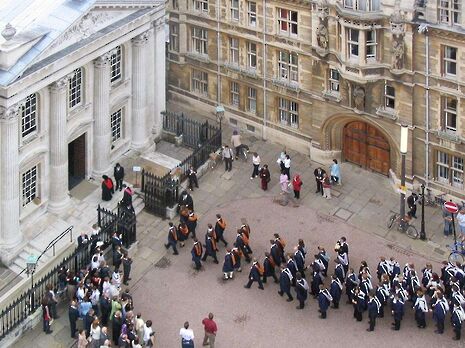Finalists look to the jobs market
With exams out of the way, graduates look to burst the Cambridge bubble

As the majority of Cambridge students enjoy May Week and the promise of the summer vacation ahead, one particular cohort are faced with a new challenge as most third-year Cantabs must delve into the murky waters of the British job market. Every year the issue of graduate jobs re-emerges across the country, especially in light of national debates on youth unemployment and the benefits of higher education.
Statistics which shed some light on the obscure world of graduate careers have recently been released by the employment website totaljobs.com. These statistics collectively present an optimistic image of a welcoming jobs market in which students can independently and freely pursue their chosen career without fear of too much competition. Indeed in the last year the number of job placements available in the UK has risen by 11 per cent whilst the number of applications per job has fallen by a rate of 22 per cent. This trend would suggest that as Britain meanders out of the financial crisis, students are increasingly able to secure a placement.
Students also seem to have become more independent and confident on the jobs market with only 32 per cent of those polled having consulted their parents with regard to job applications and only 12 per cent following in their parents’ footsteps and seeking work in the same industries as their fathers or mothers. Instead more and more of Britain’s students are using social media sites such as Facebook (22 per cent) and Twitter (11 per cent) to find out about vacancies for post-graduation work.
According to these polls, the prospects of Cambridge students are ideal; there are many new jobs available with little competition, allowing students to confidently seek employment without the need for assistance. Cambridge graduates do not need to fear unemployment following the end of their 3 or 4 year course, as figures provided by the Cambridge Careers Service demonstrate. Of last year’s graduates only 2.9 per cent were still actively seeking employment six months after completing their studies.
However, this perception may be, unfortunately, a distorted view of the realities of the struggles of the Cambridge student in finding a job. David Ainscough, the deputy director of the Careers Service, warns that baseline figures can obscure key issues, such as regional or sectorial diff erences. In a nation in which more and more young people are going to university, job applications are almost certain to cluster around the most popular job vacancies. As a result, unpopular vacancies may be skewing the statistics for the number of jobs available and the level of competition in the British job market. Ainscough argues that the popularity of positions in commercial management, the City, the public sector and media leads to a highly competitive employment environment, despite the fact that placements in London and the South East are often unaffordable due to high living costs. The increasing desire for students to undertake unpaid work further complicates these statistics.
A Varsity straw poll of current third-years revealed that these difficulties are experienced by many students, with London being both the most popular and the most fruitless destination for applications. Commenting on her experiences, Anya Vlasova, a Law finalist at Homerton who has received an offer for a training contract at a corporate law firm, stated “I applied to 11 different law firms, spent like a month writing applications, and they all rejected me bar one." She added that “Cambridge is not a ticket to any job” noting that many lawyers with solid 2.1s have failed to secure training contracts.
To the great dissatisfaction of many third year students, the conclusion that statistics indicating an improving job market are reductively simplistic is inescapable. Unemployment should not be expected in the near future for many graduates, but the Cambridge finalist will still have to face some of the inequities of the British job market.
 News / Fitz students face ‘massive invasion of privacy’ over messy rooms23 April 2024
News / Fitz students face ‘massive invasion of privacy’ over messy rooms23 April 2024 News / Climate activists smash windows of Cambridge Energy Institute22 April 2024
News / Climate activists smash windows of Cambridge Energy Institute22 April 2024 News / Copycat don caught again19 April 2024
News / Copycat don caught again19 April 2024 News / Emmanuel College cuts ties with ‘race-realist’ fellow19 April 2024
News / Emmanuel College cuts ties with ‘race-realist’ fellow19 April 2024 Comment / Does Lucy Cavendish need a billionaire bailout?22 April 2024
Comment / Does Lucy Cavendish need a billionaire bailout?22 April 2024





